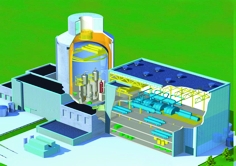The schedule for the UK’s nuclear future could be in trouble, it seems. The Health and Safety Executive’s half-way report on the Generic Design Assessment for Areva’s EPR and Westinghouse’s AP1000 reactors, which looks at the designs’ safety cases and assesses whether they are fit to be built in the UK, has revealed some concerns over the amount of information the companies have made available, and revealed that initially, the HSE was faced with a shortage of qualified people to assess the designs.

Although the HSE itself makes clear that there’s no reason to assume that the GDA won’t be completed on time, by June 2011, UK newspapers have pinpointed specific concerns about the reactors which the executive has said will need to be addressed, and said that there is still a ‘significant amount of detailed assessment work to do.’
Every setback in the nuclear sector is magnified by the press — it’s one of the problems specific to this industry, and it’s one which it is still trying to come to terms with. And it doesn’t take the Futurescope crystal ball to see the potential pitfalls here. The government puts pressure on the HSE to hurry up the GDA, design problems go unaddressed, and a delay results on the building of the reactors. More bad press, with the nuclear industry once again accused of complacency over safety issues. It would be the 70s and 80s all over again.
But the HSE calling attention to the problems it has - and what it needs from the design companies - isn’t a return to the bad old days of nuclear secrecy. Quite the opposite — it shows an openness that’s actually rather encouraging. And if Areva and Westinghouse respond in kind, that’ll be even more encouraging.
The pessimism of the press is a worrying development, though. It seems to indicate a knee-jerk damning of anything associated with nuclear. We on The Engineer are naturally inclined to be optimistic about technology, and one of the big milestones that the Futurescope shows us is the long-awaited outcome of the investigations into nuclear fusion energy. But if fusion works, the crystal ball shows us something rather worrying. There’s that word ‘nuclear’. Nuclear optimism hasn’t been borne out before — critics still bring up the old 1950s claims that nuclear power would be too cheap to meter. We can only hope that the next generation of nuclear fission is trouble-free, so the cynicism and doubts that still cling on in the public perception of nuclear are dispelled, and fusion — if it happens — doesn’t have to fight the tide of pessimism.
Stuart Nathan
Special Projects Editor




Red Bull makes hydrogen fuel cell play with AVL
Formula 1 is an anachronistic anomaly where its only cutting edge is in engine development. The rules prohibit any real innovation and there would be...